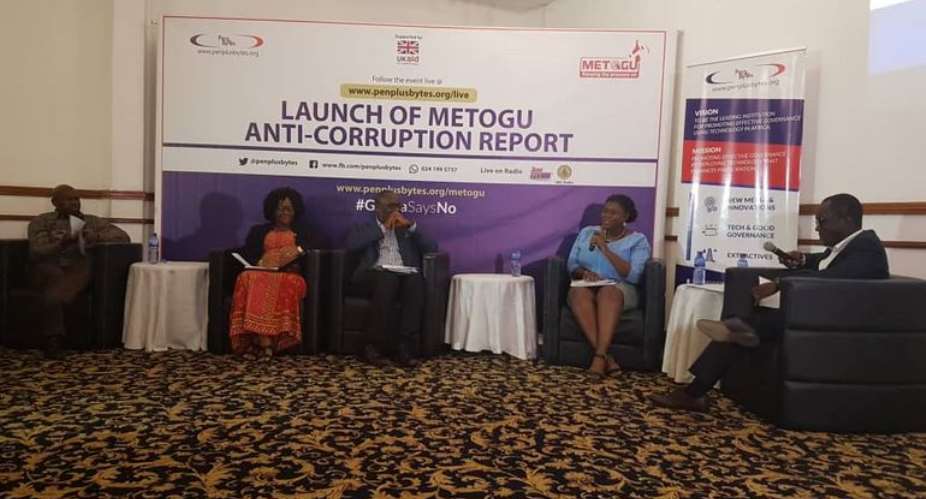The Deputy Auditor General, George Swanzy Winful said they will embark on a more proactive approach in dealing with individuals and organizations that have been surcharged for misappropriating funds and monies they took from the state which they did not deserve.
He noted that this time around, they will attach the properties of surchargees to their report adding that, it will afford them the opportunity to retrieve those monies by confiscating their properties.
These steps, Mr. Winful indicated will further be entrenched in a report which will be released with names of individuals and organizations that have been surcharged by the Auditor.
According to him, efforts to track down surchargees in the past have been fruitless, forcing them to publish only their names.
The Deputy Auditor General said this during a panel discussion on “How Can the Anti-corruption Movement in Ghana Sharpen Up their Acts” at the launch of the METOGU Anti-corruption Report in Accra organized by Penplusbytes.
He added that in their effort to recover wrongfully paid funds back to the state, they issued surcharge certificates against them but that has always fallen on rocks.
In December 2017, the Auditor General released a list of 62 organisations surcharged by the Auditor for receiving payments from the state without any documentation as proof.
The companies, mostly private organisations, also include some state institutions and staff of some government agencies.
The Deputy Auditor General’s comments follows a new report by Penplusbytes which pointed out that 7 out of 10 Ghanaians say the ruling NPP Government is losing the fight against corruption despite Parliament approval of the establishment of the Office of the Special Prosecutor.
Penplusbytes’ METOGU study findings on Anti-corruption indicates, some Ghanaians hold a perception that government’s attitude in delivering on its promises to curb corruption is rather lukewarm.
The report added that over 95 percent of the respondents in the study affirmed that corruption is high in Ghana and is highly pervasive in the public sector where vast majority have had to pay facilitation or illegal fees to access services.
Furthermore, the Sustainable Development Goal 16 specifically mentioned the issue of corruption and the need to deal with it.
Based on this assertion, Penplusbytes’ (www.penplusbytes.org ) under the UK-AID funded “Strengthening Action Against Corruption” (STAAC) programme embarked on the METOGU! (keeping the pressure on!) project to create awareness about the current governments promises on anti-corruption and at the same time carry out a research to gauge citizens perception of how government is performing in implementing its anti-corruption promises through a comprehensive participatory monitoring & evaluation (PM&E) tool.
The Push Factor
According to Penplusbytes, in the run-up to the 2016 elections in Ghana, corruption dominated the discourse of all the political parties. And, indeed, the Sustainable Development Goal 16 specifically focuses on the issue of corruption and highlights the need to deal with it worldwide.
It indicated that holding duty bearers for their manifesto promises is important because such promises influence voter behavior and serve as the yardstick to measure the performance of political parties. Conducting a rigorous study into how the NPP government is dealing with the issue is therefore an important effort.
Penplusbytes noted that the overarching aim of the “Metogu” (keep the pressure up) project is to investigate how the NPP government is delivering on its manifesto promises on anti-corruption as well as other specific sector promises where it proposes to use new tools in fighting the problem of corruption.






 We’ll no longer tolerate your empty, unwarranted attacks – TUC blasts Prof Adei
We’ll no longer tolerate your empty, unwarranted attacks – TUC blasts Prof Adei
 Bawumia donates GHc200,000 to support Madina fire victims
Bawumia donates GHc200,000 to support Madina fire victims
 IMF to disburse US$360million third tranche to Ghana without creditors MoU
IMF to disburse US$360million third tranche to Ghana without creditors MoU
 Truck owner share insights into train collision incident
Truck owner share insights into train collision incident
 Paramount chief of Bassare Traditional Area passes on
Paramount chief of Bassare Traditional Area passes on
 Two teachers in court over alleged illegal possession of BECE papers
Two teachers in court over alleged illegal possession of BECE papers
 Sunyani: Victim allegedly shot by traditional warriors appeals for justice
Sunyani: Victim allegedly shot by traditional warriors appeals for justice
 Mahama vows to scrap teacher licensure exams, review Free SHS policy
Mahama vows to scrap teacher licensure exams, review Free SHS policy
 Government will replace burnt Madina shops with a new three-story, 120-store fac...
Government will replace burnt Madina shops with a new three-story, 120-store fac...
